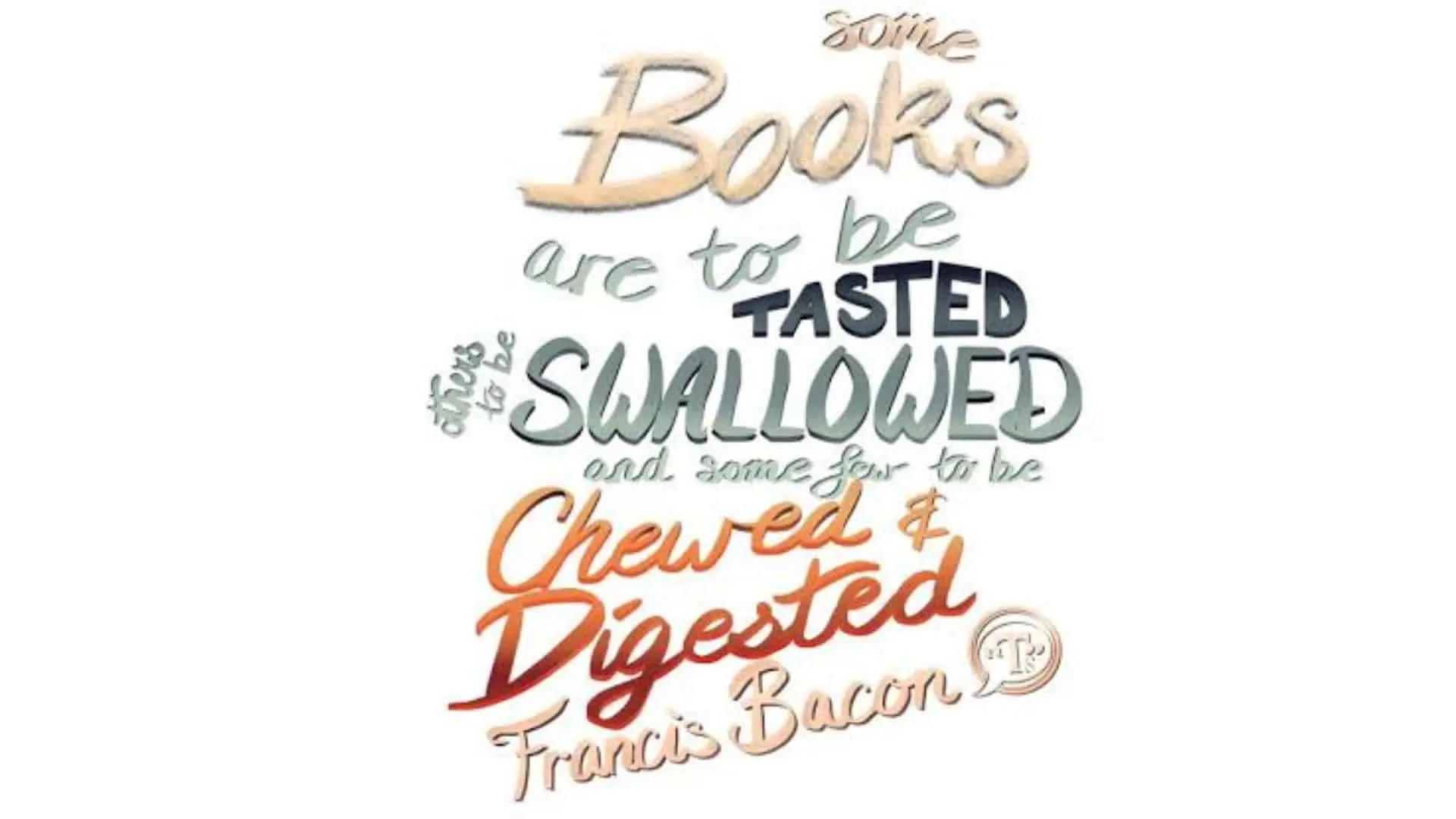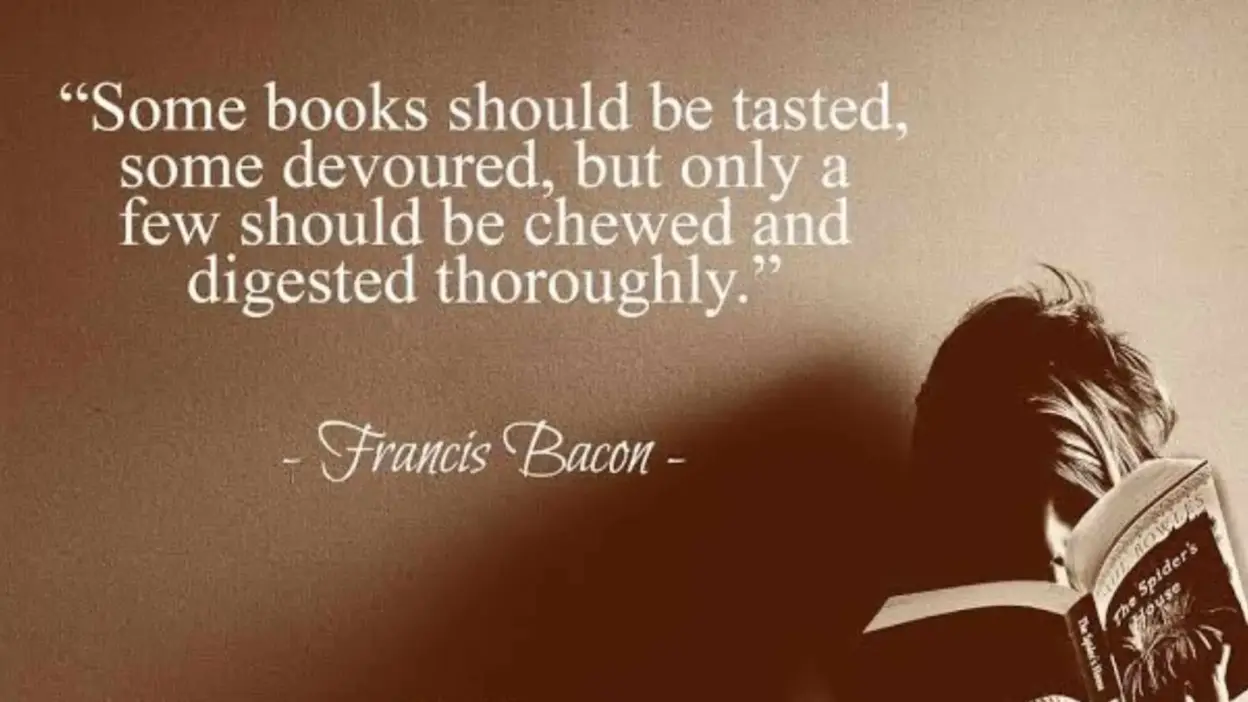Books have the power to shape our thoughts, inspire us, challenge us, and even transform our very understanding of the world. The famous quote by Sir Francis Bacon, “Some books should be tasted, some devoured, but only a few should be chewed and digested thoroughly,” captures the essence of how different types of books impact us differently. Each book offers its own unique flavor, and how we approach it can vary depending on its depth, subject matter, and our own personal needs at the time.
This quote, rich in metaphor, teaches us that not all books require the same level of attention or engagement. It provides us with a framework to classify literature and gives insight into how we should approach reading. In this Blog, we’ll dissect the hidden meanings behind this quote, explore its relevance in today’s fast-paced world, and understand how to apply it to our reading habits.
The Hidden Meaning Behind the Metaphor
1. Tasting Books: The Books of Leisure
When Bacon speaks of “tasting” Books, he refers to those light reads that provide brief entertainment or a quick burst of information. These are the books that we pick up to relax, to escape reality for a little while, or simply to enjoy the surface-level experience of reading. Such books are often fiction—romance novels, thrillers, or cozy mysteries—or perhaps a short non-fiction piece that gives us something to think about without demanding deep engagement.
Tasting books is like sampling a dish at a buffet. You savor it momentarily but don’t necessarily commit to eating the whole thing. These are books that may not leave a long-lasting impact, but they serve a purpose at the moment. They are not meant to be over-analyzed or critically evaluated. You pick them up, enjoy them, and move on.
Examples of such “tasted” books might include:
- A lighthearted summer beach read.
- A mystery novel with twists that keep you engaged but don’t challenge you intellectually.
- A motivational book that offers inspiration but doesn’t require deep contemplation.
2. Devouring Books: Immersive Reads
When Bacon talks about “devouring” books, he refers to those books that grip us so powerfully that we can’t put them down. These are the books that consume us just as much as we consume them. We read them quickly, often in one sitting, not because they are light, but because they draw us in and don’t let go until we’ve absorbed everything they have to offer.
Devouring a book is akin to getting lost in its world. It can be an engaging novel with a powerful storyline or an exciting non-fiction piece that captivates us. These are the books that we finish quickly but leave us wanting more. While they might not require extensive reflection, they still resonate with us on an emotional or intellectual level.
Books that are devoured tend to be those that are plot-driven, with compelling narratives or gripping insights. For example:
- A page-turner thriller or fantasy novel where the story sweeps you away.
- A biography that reveals unexpected depths about a fascinating individual.
- A powerful self-help book that provides a transformative perspective on life.
3. Chewing and Digesting Books: The True Masterpieces
The final part of the quote, “only a few should be chewed and digested thoroughly,” speaks to the rare books that demand time, patience, and deep contemplation. These are the books that are so rich in ideas, concepts, and wisdom that they require slow, thoughtful reading. You cannot rush through these works. They require you to read, re-read, and reflect upon their deeper meanings.
To “chew and digest” a book is to engage with it on a profound level. These are books that challenge our thinking, broaden our understanding of the world, and stay with us for a lifetime. Often, they are complex works of literature, philosophy, or science that can’t be fully understood in one sitting. They offer new insights each time you return to them and grow in meaning as you mature as a reader.
Books worthy of being “chewed and digested” often include:
- Classic literature like Tolstoy’s War and Peace or James Joyce’s Ulysses.
- Philosophical works such as Plato’s The Republic or Nietzsche’s Thus Spoke Zarathustra.
- Deeply reflective non-fiction such as Viktor Frankl’s Man’s Search for Meaning or Carl Sagan’s Cosmos.
These books require active engagement, critical thinking, and sometimes external research to fully grasp their significance. Unlike books that are merely tasted or devoured, the process of digesting a book involves deep reflection, which can lead to personal growth and transformation.

Why Some Books Deserve Thorough Digestion
Certain books resonate more deeply with our core beliefs and our view of the world. These are the books that don’t just entertain us but teach us something new about the human condition, ethics, or philosophy. They might help us make sense of our own lives or provide answers to questions we’ve long pondered.
Books that deserve thorough digestion have layers of meaning. They are not just about what happens in the story but also about the themes, symbols, and ideas that permeate the text. They are open to interpretation and can spark debates or discussions that last for years. When we digest these books, we allow them to become part of our intellectual framework, informing how we think and act in the world.
The Role of Reading in Modern Times
In today’s fast-paced digital age, where information is abundant and time is scarce, Bacon’s quote becomes even more relevant. We live in a time where it is easy to skim through books, articles, and media without fully absorbing their content. With e-books, social media, and streaming services at our fingertips, the act of deep reading and reflection often gets sidelined.
Bacon’s wisdom reminds us that not all content deserves the same level of attention. We need to be selective about what we give our time to. It’s perfectly fine to “taste” books that offer entertainment or light education, but we should reserve space for the “masterpieces”—the books that require slow, deliberate reading.
Applying Bacon’s Philosophy to Your Reading Habits
How can we apply Bacon’s philosophy to our own reading habits? Here are some tips:
- Be selective with your reading: Not every book you encounter needs to be devoured or digested. Recognize which books are for leisure and which deserve deeper engagement.
- Take your time with masterpieces: When you come across a book that offers complex ideas or profound wisdom, don’t rush. Take the time to fully understand its meaning and implications.
- Re-read important books: Masterpieces often reveal new layers of meaning upon multiple readings. Don’t hesitate to return to a book that has deeply affected you in the past.
- Discuss and reflect: Books that are chewed and digested thoroughly often spark discussions. Engage in conversations with others or write about the book to deepen your understanding.
Conclusion
Francis Bacon’s metaphorical classification of books—those to be tasted, devoured, or chewed and digested—provides timeless advice for how we approach reading. Not every book requires deep analysis, but those that do can offer profound insights that shape who we are. In a world flooded with information, Bacon’s wisdom urges us to be mindful of what we consume, ensuring that we engage deeply with the works that truly matter. After all, the books we choose to “digest” shape our worldview and, ultimately, our lives.
Also Read: I would rather share one lifetime with you than face all the ages of this world alone



